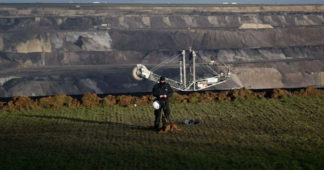By Franklin Frederick
This Saturday, July 20, over ten thousand people took part in a demonstration in the small town of Melle, in the Poitou region of France. From July 16 to 21, Melle became a “water village”, bringing together French citizens – mostly farmers – to protest against industrial agriculture and its impact on soil and water, in particular against the “mega bassines”, giant artificial reservoirs used by French agro-industry to irrigate its plantations. Agribusiness seems to be as destructive in France as it is in Brazil.
Will the European Union be able to confront its agro-industry and its practices on its own territory? The French people mobilized in the Poitou region know that it won’t, which is why the demonstration on Saturday 20th is also a demonstration against the neoliberalism and fascism that won so many votes in the last French elections and throughout Europe. It seems that the French are increasingly dissatisfied with the “solutions” presented by the French government and the European Union to the pressing economic, environmental and social problems of our time.
A recent example of these neoliberal “solutions” is the law that came into force in the European Union on July 3rd, requiring all plastic bottle caps to be attached to the bottle. This measure is intended to curb the increase in plastic pollution, as these caps are among the most common elements found in ecosystems around the world. It seems that Coca Cola was the first to introduce this measure to increase the recycling capacity of its products, since the caps on its bottles are always made from recycled materials. We can now rest assured that the Europeans are taking fundamental steps to reduce the plastic pollution spreading over land and oceans!
What we didn’t know was that the problem were the bottle caps! It took the visionary Coca Cola executives to come up with this simple, effective solution for EU legislators to turn it into law!
This is the level of “solutions” proposed by the European Union to contain serious problems such as plastic pollution! But measures like this are perfectly in line with prevailing neoliberalism and, as such, are the only ones that can be accepted or even discussed.
The fact that Western Europe has an excellent public water supply system and that plastic water bottles are totally unnecessary and an expensive luxury, and that their production should therefore be phased out, doesn’t cross the minds of European legislators. Yet this would be a concrete step towards reducing the production of plastic pollutants and their impact on global warming, since the raw material for their production is oil. Fixing the cap on other plastic bottled beverages could be a complementary measure. The most important thing is to reduce plastic production now, and stopping the production and marketing of bottled water in countries where it is not needed would be a first step.
On July 17th, Portugal’s Minister for the Environment and Energy, Maria da Graça Carvalho, sent an open letter to the European Commission warning about water problems in Europe. The letter was signed by 20 other EU countries. In the text of this document, the Minister writes:
“Water is a strategic and vital resource that plays a key role in sustaining life, regulating ecosystems, ensuring the well-functioning of our economy and society and the well-being of our citizens. At the same time, water is increasingly under pressure across Europe. Climate crisis, with the increase in the frequency and intensity of extreme phenomena, is due to exacerbate this pressure and to increase water related-risks, with cross-cutting severe impacts. Increasing regions in Europe are already facing a limitation of natural freshwater resources which have become insufficient to meet water demands. Droughts, water scarcity and floods are no longer an anomaly in Europe. According to the European Environment Agency, around 20% of the European territory and 30% of Europeans suffer from water stress every year. The economic cost is estimated at around €9 billion per year, with this figure excluding damage to ecosystems, and it could reach €65 billion per year by the end of the century. The losses are mainly felt in agriculture and food systems, the energy sector and public supply. Regarding floods, a study published by the European Commission in 2021 estimated the total costs of mitigating flood risks for the period 2016-2021 to be at least €14 billion.
Concrete action is therefore needed to boost water security and resilience across the European Union. This is a common challenge. It should be a top priority in the EU agenda, translated into a comprehensive approach at the EU level.”
The warning is clear, and the Portuguese minister’s initiative is important and should be supported. But how can we meet this common challenge within a neoliberal framework? In her letter, the Minister continues:
“A higher level of articulation is required at European level, covering water in all its dimensions: fresh and saltwater resources, protection of ecosystems, human consumption, agriculture and food systems, energy and industries. This challenge requires adapting activities to existing water resources, ensuring efficiency in supply and demand, promoting environmental protection and maintenance of the ecosystems, integrating conventional and non-conventional resources and ensuring that resilience is achieved in a fair and equitable manner which respects the diverse hydrological and hydrogeological environment of Europe. Strengthening water management in the European Union will require a strategic mobilization of knowledge, technology and innovation, integrated planning and management tools, and monitoring (availability, consumption).”
So far, I think we can all agree with what the Minister has said. However, the problem comes immediately afterwards, when she writes:
“The transition to water resilience also requires increased investment in adapting activities and territories to climate change scenarios, using both traditional and innovative financial instruments capable of mobilizing and leveraging private investment.”
In the Minister’s letter, there’s not a word about the need to strengthen and invest in the PUBLIC SECTOR, particularly in Europe’s public water companies, which play a fundamental role in this whole process. Nor is there a word about the need to contain the environmental and climatic devastation and impacts caused by the private sector. According to the Minister, the private sector must be mobilized to invest in solutions – in the neoliberal mindset, the private sector is always the solution, and the problem is the bottle cap!
That’s why the Poitou meeting is so important.
Right now, we need to be very clear, whether in South America or in Europe: neoliberalism is fascism in civilian clothes. And fascism is neoliberalism wearing boots and a uniform.
When neoliberalism succeeds in imposing market authoritarianism in all spheres of political and social decision-making, with little or no resistance, it presents itself as “civilized” and “necessary” – the famous “there’s no alternative”. But when people organize and their resistance challenges the market’s authoritarian project, neoliberalism takes its uniform from the wardrobe and starts putting on its boots.
After the victory of the Left in the French elections, the Poitou meeting continues the political fight to defend the planet.
We remind our readers that publication of articles on our site does not mean that we agree with what is written. Our policy is to publish anything which we consider of interest, so as to assist our readers in forming their opinions. Sometimes we even publish articles with which we totally disagree, since we believe it is important for our readers to be informed on as wide a spectrum of views as possible.











